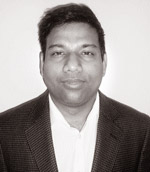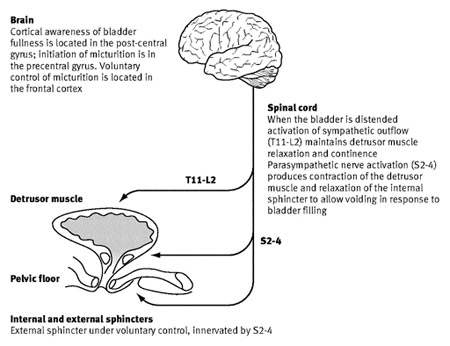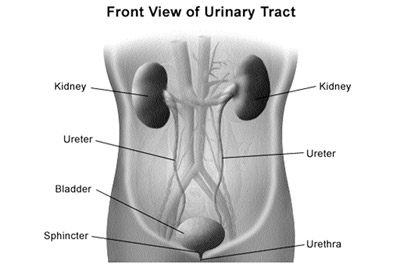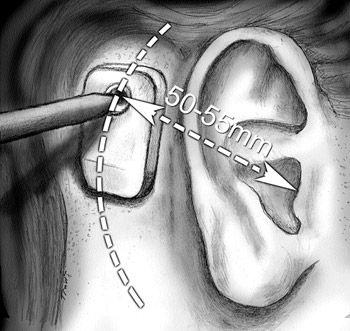|
Health Watch
Urinary incontinence in women:
Is there a way out?
Dr. K Sivanesan
***********------
I just cannot wait to
go to the loo... A helpful advice regarding overactive bladder
What is overactive
bladder?
**********----
If you have the sudden rush to go to the loo, it is called urgency
and if you leak urine associated with this, it is called urge
incontinence of urine. This condition is also called unstable bladder or
overactive bladder. Your bladder tries to squeeze urine out even though
it is not full.
|

Dr K Sivanesan |
This could be associated with the need to go to pass urine many times
a day (called frequency) and you might be passing very little amount of
urine on these occasions. In some patients, it could be associated with
the need to get up in the night more than two occasions (nocturia).
This condition can occur at any age. Women most often are embarrassed
to discuss this with their doctor and might go on for many years without
reporting to anyone about this. One in five women in the UK have this
problem and I do not know the true prevalence of this condition in Sri
Lanka. But this condition can be controlled with simple measures and
medications in most patients.
Your bladder has a smooth muscle called detrusor muscle. During the
filling of urine which is produced by kidneys, bladder fills without
much pressure due to stretching of the bladder muscle and is able to
have 400-500 mls of urine without much urge. When the time is ready, the
bladder muscle contracts and the bladder empties. Usually people go to
the loo between four - eight times a day.
What causes this condition?
It is often very difficult to say as to why this condition occurs. In
most instances, we cannot find a cause for these symptoms. This could be
due to simple bladder infection which has not been treated. Drinks
containing caffeine and alcohol can irritate the bladder.

Some people do not drink enough water and this can irritate the
bladder too. In some patients, it could be due to bladder stone or
tumour. Alzheimer’s disease, stroke and multiple sclerosis also can
cause these symptoms. Uncontrolled diabetes too can lead to these
symptoms including bothersome nocturia.
What should you do if you think you are having overactive bladder?
It is important that you discuss this with your doctor (family doctor
or your gynaecologist). They will explore your symptoms and be able to
advice and treat you depending on your symptoms and causes.
What are the investigations your doctor might carry out?
Urine dipstick and urine culture - this is to rule out any ongoing
infection in your bladder as well as to rule out any presence of blood
in the urine.
Residual urine in the bladder - this could be done with a simple scan
of your bladder after you emptied it or by passing a catheter into your
bladder.
Bladder diary - this involves filling a chart where you record the
amount, time and type of fluid/drink intake for at least three days
during day and night. You also need to record the time and amount of
urine passed as well as be able to record when the urine leaks occurred.
Internal examination - this is to check your pelvic muscle strength
as well as to rule out any presence of prolapse of pelvic organs.
Cystometry - this is not required in all the patients and usually
reserved for patients where initial treatment is not working. This can
be a very uncomfortable investigation.
Cystoscopy - this is required if your urine has blood or if the
initial medications and lifestyle changes haven’t made any significant
impact on your symptoms.
What are the treatments available to treat this condition?
There are many simple measures which can help to control the
symptoms. First of all drinking adequate amount of fluids every day. We
recommend at least 1500 - 2000 mls of fluids every day.
If you drink less, then you should consider increasing the amount
little by little. Cutting down the number of cups of tea or coffee you
drink every day can help.
You may want to try decaffeinated tea instead. Cutting down fizzy
drinks such as cola is a good idea. Good control of diabetes is advised.
If you have to get up in the night many times, reducing the amount of
fluids in the evenings would help.
Bladder retraining
This is a simple method but needs a lot of determination and effort.
If you go to the bathroom every hour, you may want to wait for another
30 mins and you can increase this time interval gradually.
 Also try to think or do something else when you get the urge to pass
urine. This helps your bladder to retrain itself. It will get used to
hold more urine for longer period and symptoms of urgency will gradually
improve. Also try to think or do something else when you get the urge to pass
urine. This helps your bladder to retrain itself. It will get used to
hold more urine for longer period and symptoms of urgency will gradually
improve.
Pelvic floor exercises
Your physiotherapist might be able to show how to squeeze your pelvic
muscles and be able to make sure that you are doing them correctly.
Pelvic muscle squeeze can help you to overcome urgency.
Medications
There are many different medications which help the bladder muscle to
relax. They may be expensive in Sri Lankan setting. They have side
effects such as dry mouth and nausea. They can reduce the times you need
to go to the bathroom, reduce the sense of rush/urgency as well as
number of episodes you leak.
Tablets take few weeks to make any change in your symptoms and your
doctor might try few medications to find the one that suits you! These
tablets are not suitable if you are suffering from glaucoma.
If the tablets do not work, your doctor may want to perform
Cystoscopy (passing a camera to look inside your bladder).
Other treatments
Injections of botox into the bladder muscle, sacral nerve modulation,
percutaneous tibial nerve stimulation, clam ileocystoplasty or urinary
diversion are the other forms of treatment options available to treat
this condition.
For queries contact: [email protected].
BAHA surgery a success
Edward Arambewala
Sri Lanka has successfully completed the first-ever local BAHA (Bone
Anchored Hearing Aid) surgery. This high-tech surgery will help those
suffering from hearing impairments due to their middle ear being blocked
or damaged or for those with only one ear functional.
|

The BAHA surgery |
Being able to complete such surgery locally is a new step to
providing cost-effective hope to those lacking the gift of hearing.
WISH President Mihira Wickramarachchi – Wickramarachchi Institute of
Speech and Hearing initiated this program in partnership with private
and Government hospitals. These implants are done when neither the use
of hearing aids nor Cochlear implants are effective. This is the final
step of hearing solutions and it has not been implemented in Sri Lanka
previously.
Now we have implemented all sophisticated palpable hearing solutions
in Sri Lanka creating a landmark in ENT surgical practice. WISH has
served by providing hearing solutions to more than 1 million Sri Lankans
over the last thirty years, and through its aural therapy arm, WISH has
already completed more than 100 Cochlear Implant Surgeries in Sri Lanka.
About 5 percent of the Sri Lankan population suffers from hearing
impairments and President fund has helped this program to reduce their
surgery cost.
Wickramarachchi says that Sri Lanka has every hearing assessment and
all surgical techniques used are the same as in any developed country
and WISH, together with Apollo Hospital, Durdans Hospital, Lady Ridgeway
Hospital and the National Hospital are implementing these surgical
procedures.
There are many surgeons in Sri Lanka who are now capable of
performing these surgeries upto international standards. The institute
also implements auditory verbal therapy and has trained many speech
therapists in the health, education and social service sectors free and
donated more than 3000 hearing aids to schoolchildren.
Talk on rebirth
Edward Arambewala
Health Watch is making arrangements for Sri Lanka’s leading Clinical
Hypnotist and Family Physician in Kandy Dr H B Jayasinghe (MBBS, MCGP,
MDCH (Lon) MBS CH (UK) CH (USA) to give an interesting talk on (Rebirth
is there acceptable proof?) at the SLMA Auditorium, Wijerama Mawatha in
June, when he returns from UK.
Dr Jayasinghe who has earlier also given a talk at the SLMA arranged
by the Health Watch has accepted to give this talk on the new area of
proof and research done so far. Health Watch invites readers, to send
their questions and views on this and it will be responded by Dr
Jayasinghe at the talk.
Send your questions and views addressed to Health Watch Talk on
Rebirth, c/o Features Editor, Daily News, ANCL Lake House, D R
Wijewardena Mawatha Colombo 10.
EA
Arthritis impacts physical, mental health
Amanda Gardner
Arthritis can limit mobility and make everyday tasks painful, and it
can also take a toll on your mental health and overall quality of life,
a new study suggests.
Researchers analyzed data from several national health surveys
conducted by the Centers for Disease Control and Prevention (CDC) and
found that people with arthritis—which includes those with aging-related
osteoarthritis and similar conditions such as rheumatoid arthritis and
gout—tend to rate lower than their peers on measures of overall health.
Twenty-seven percent of the survey respondents with some form of
arthritis described their health as “fair” or “poor,” versus just 12
percent of those without arthritis Those with arthritis also reported
having more than twice as many “physically unhealthy days” in the
previous month.
The surveys showed a similar pattern for mental health. People with
arthritis experienced an average of five “mentally unhealthy days” per
month, compared to three per month among those who were arthritis free,
according to the study, which appears in Arthritis Care & Research.
“People who have arthritis, particularly rheumatoid arthritis, have
significant rates of depression,” Mayo Clinic, in Rochester, Minnessota
rheumatology chair Eric L. Matteson, MD, who was not involved with the
study. “And there’s no question that when you feel depressed, it
influences your general sense of well-being and how arthritis affects
you.”
Moreover, when arthritis is acting up, metabolic and other changes in
the body can increase levels of inflammation, which can worsen
depression, Dr. Matteson says. “That highlights the importance of not
only controlling the disease or managing the disease but also getting
depression under control, too.”
More than one-fifth of the US population has some form of arthritis,
according to the CDC.
The rate has been rising, partly because of the aging of the
baby-boom generation.
But the obesity epidemic is also partly to blame, since excess weight
can strain inflamed joints.
Physical activity was linked to a higher quality of life, the
researchers found.
People who managed to exercise in spite of their arthritis were 53
percent less likely to be in fair or poor health than were inactive
arthritis patients, says the lead author of the study, Sylvia Furner,
PhD, an epidemiologist at the University of Illinois at Chicago.
“Physical activity does a lot to strengthen and support the joints,
and there’s a lot of pain relief that comes along with exercise,” says
rheumatologist Allyson McDonough, MD, assistant professor of internal
medicine at the Texas A&M Health Science Center College of Medicine, in
Temple.
Low-impact exercise - such as walking, swimming, yoga, or tai chi -
is “extremely important to improve quality of life,” she says.
“There’s a significant perception that there’s nothing that can be
done about arthritis,” says Dr. McDonough, who was not involved in the
research.
“That’s inaccurate. Seeking care and looking for avenues of self-help
will help improve quality of life.”
Health.com
Questionnaire may help predict autism at one year
A quick and simple questionnaire given to parents during a regular
checkup in a pediatrician’s office may help detect autism in children as
young as 1 year old, a new study suggests.
The 24-item questionnaire, which assesses a child’s ability to
communicate with eye contact, sounds, and gestures, may steer infants
who show early signs of autism spectrum disorders (ASDs) into
appropriate treatment at earlier ages, the researchers say.
Identifying language and developmental delays in babies may also help
scientists uncover the underlying neurological processes of autism,
paving the way for more effective treatments, says Karen Pierce, Ph.D.,
the lead author of the study.
“Most of the studies on autism are on adolescents and adults,” says
Pierce, an assistant professor of neuroscience at the University of
California San Diego (UCSD), in La Jolla. “Some (are) on children, but
very few people have the ability to study autism in babies, because we
can’t diagnose it until 3 or 4 years.
How in the world are we going to discover the causes if we’re
studying brains that have had a lifetime of living with autism, and
(have) a host of compensatory mechanisms?”
The average age of ASD diagnosis is around 5 years old, though most
of those children show signs of developmental problems before age 3,
according to the Centers for Disease Control and Prevention.
There are no biomarkers to indicate that a child has autism, so
clinicians have to rely on behavioral clues, making diagnosis tricky.
And even when a child is accurately diagnosed early, he or she often
doesn’t start treatment until some time after the diagnosis.
The questionnaire used in the study is a simple checklist that asks
parents to say whether their baby displays certain types of
communication “often,” “sometimes,” or “not yet.” It takes just five
minutes to fill out and can be scored on the spot.
The checklist does not zero in specifically on autism but “will tell
you something is wrong,” Pierce says. That could be the early signs of
autism or another type of language or developmental delay.
In the study, which appears in the Journal of Pediatrics, 137
pediatricians in the San Diego area screened more than 10,000 children
who were undergoing their one-year checkup.
Of those, 184 were determined to be below the appropriate levels of
development for their age, and were referred to UCSD’s Autism Center of
Excellence for further evaluation.
Doctors examined them every six months until they were 3 years old.
So far, 32 children have been definitely or provisionally diagnosed
with an autism spectrum disorder, 56 with a learning disorder, and nine
with another disorder.
Based on these findings, the researchers estimate that 20 percent of
children flagged by the checklist at 12 months will go on to develop
autism and 55 percent will develop a learning or developmental disorder.
Twenty-five percent will get a false-positive result, they say,
giving the questionnaire a high accuracy rate of 75 percent.
Five children in this study sample who were initially diagnosed with
ASD were later determined not to have an autism disorder. And, as hoped,
the children who were assigned a diagnosis of autism or a learning or
developmental delay started treatment at an average age of 19 months.
In theory, earlier treatment might influence how connections between
neurons are being made in the brain, greatly influencing a child’s
emotional and social development, Pierce says.
But that remains an open question, says Keith A. Young, PhD, vice
chairman for research in the department of psychiatry and behavioral
science at the Texas A&M Health Science Center College of Medicine, in
Temple.
“At this point in time, there are no validated treatments at that
young of an age,” Young says. “There are various treatments that have
been tested in older kids, but do they work in younger kids? How do we
need to adapt them? All of that stuff needs to be done before we go out
and say, ‘OK, there needs to be screening.’”
Health.com
Medical Crossword Draw No 46 in Galle
Medical Crossword Draw No 46 will be held in Galle on May 15 at 10am
at J M Wickremarachchi Opticians No 17, Wakwella Road, Galle.
A talk on how glare affects the eye, is being arranged by the
Crossword Sponsors wish Institute.
We wish to thank retired Director of Meteorology Dr Ian D T de Mel
for writing to us, offering his help in an advisory capacity to Dr Kelum
Pelpola in compiling the Crossword.
EA |



